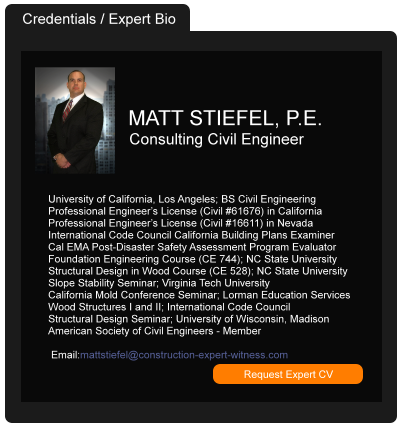Contractors: Revisit your Force Majeure Provisions to Account for Hurricanes
September 20, 2017 —
David Adelstein - Florida Construction Legal UpdatesWe now know and can appreciate the threat of hurricanes. Not that we did not appreciate the reality of hurricanes–of course we did–but Hurricane Harvey and Hurricane Irma created the type of actual devastation we fear because they hit close to home. The fear came to life, creating panic, anxiety, and uncertainty. It is hard to plan for a force majeure event such as a hurricane because of the capriciousness of Mother Nature. But, we need to do so from this point forward. No exception! And, I mean no exception!!
A force majeure event is an uncontrollable event that cannot be anticipated with any degree of definitiveness. The force majeure event will excusably delay or hinder performance obligations under a contract. One type of force majeure event is a hurricane—an uncontrollable and unforeseen act of Mother Nature.
Read the court decisionRead the full story...Reprinted courtesy of
David Adelstein, Florida Construction Legal UpdatesMr. Adelstein may be contacted at
dadelstein@gmail.com
Court’s Ruling on SB800 “Surprising to Some”
October 16, 2013 —
CDJ STAFFDescribing it as “surprising to many in the residential home building industry,” Jay Drake of Reuben, Junius & Rose LLP has a piece discussing the recent California Court of Appeals decision that SB800 is not a homeowner’s only remedy for construction defects. The court found, according to Mr. Drake that “the primary purpose of the Act was to provide a property owner with remedies for repair of construction defects before the defects caused actual damages.” In the case before the court, the construction defects had already lead to further damages.
Mr. Drake notes that the legislative history of SB800 puts the bill in response to an earlier California court case in which the courts determined that without actual damage to property, a homeowner could not file a construction defect lawsuit. The court concluded that SB800 was not intended to limit the homeowner’s rights after a construction defect situation has lead to damage.
Read the court decisionRead the full story...Reprinted courtesy of
Denver Officials Clamor for State Construction Defect Law
August 20, 2014 —
Beverley BevenFlorez-CDJ STAFFThe Denver Business Journal reported that a construction defects law to encourage more condo development in Colorado was discussed during the Denver Metro Chamber of Commerce’s annual State of the City event.
Colorado Senator Jessie Ulibarri in attendance stated that the construction defect bill that he had sponsored earlier this year was defeated partly due to timing, and he plans on introducing a new bill early 2015.
Denver Mayor Michael Hancock spoke in favor of such a bill, alleging that nearly all developers avoid building multifamily units for fear of potential litigation. “We are being hamstrung by this law in the state of Colorado.”
However, the Denver Business Journal reported that those who favor status quo, including homeowners association industry groups and attorneys, claim that “changing the law will open the door to poor work on the part of developers and builders, leaving condo buyers holding the bag for repairs when something goes wrong in their home.”
Read the court decisionRead the full story...Reprinted courtesy of
Extreme Weather Events Show Why the Construction Supply Chain Needs a Risk-Management Transformation
July 24, 2023 —
Brad Barth - Construction ExecutiveA perfect storm of recent extreme weather events has exposed the fragility of North America’s construction supply chains amid an increasingly fluctuating, fast-changing risk landscape. Supply chains that were already reeling from resurgent demand for raw materials coming out of the pandemic have been further disrupted by major storms such as recent tornados in Arkansas and Mississippi. Such events can have a ripple effect across many distinct supply lines as exemplified when the 2021 Texas freeze caused railroad closures and knocked out both petrochemical and semiconductor plants, causing shortages that affected construction and many other industries.
The wide-ranging reverberations from these events demonstrate how stakeholders across all stages of capital projects increasingly share common vulnerabilities. Crucially, the way in which disruption from extreme weather events has caused project delays and cost overruns shows how time, cost and scope are increasingly interlinked and equally vulnerable to systemic risks.
Traditional project-management methods where risks are not collectively managed and mitigated by all stakeholders are becoming increasingly inadequate, as risks to cost, time and scope are often considered in isolation. The domino effect of supply-chain disruption across capital projects similarly shows the inadequacy of project-management models where suppliers are not afforded a key stake in the project (or sometimes even a seat at the planning table). This traditional model cannot adapt to sudden, systemic risks that disrupt multiple suppliers and ripple out across all stakeholders, deliverables and project-management metrics.
Reprinted courtesy of
Brad Barth, Construction Executive, a publication of Associated Builders and Contractors. All rights reserved.
Read the court decisionRead the full story...Reprinted courtesy of
CISA Guidance 3.1: Not Much Change for Construction
June 22, 2020 —
Laura Bourgeois LoBue - Gravel2Gavel Construction & Real Estate Law BlogThis week, the Cybersecurity & Infrastructure Security Agency (CISA) issued Version 3.1 of its Guidance on the Essential Critical Infrastructure Workforce. For the most part, CISA’s Guidance 3.1 did not change from Version 3.0 as it relates to construction. However, CISA added a few construction-related services to “Essential Critical Infrastructure”:
- “Workers who support the construction and maintenance of electric vehicle charging stations.”
- “Engineers performing or supporting safety inspections.”
Read the court decisionRead the full story...Reprinted courtesy of
Laura Bourgeois LoBue, PillsburyMs. LoBue may be contacted at
laura.lobue@pillsburylaw.com
The EEOC Is Actively Targeting the Construction Industry
February 27, 2023 —
Cameron S. Hill Sr. & Maia Fleischman, Construction ExecutiveRisks and potential liabilities in the construction industry are not new. Construction participants know the typical hot spots: Projects are delayed. Supply chain issues raise materials costs. Owners and general contractors dispute the effects of changes in the scope of work. Employees can become injured.
Be aware that workplace conduct and practices are increasingly a priority and focus for governmental intervention, resulting in increased risk management attention on the construction industry. The Equal Employment Opportunity Commission (EEOC) is watching, and if you are not prepared, you could be liable for hundreds of thousands of dollars related to how your employees interact with each other. We recommend you immediately review your employment policies and procedures in addition to considering an update of your training practices.
Reprinted courtesy of
Cameron S. Hill Sr. and Maia Fleischman, Construction Executive, a publication of Associated Builders and Contractors. All rights reserved.
Mr. Hill may be contacted at chill@bakerdonelson.com
Ms. Fleischman may be contacted at mfleischman@bakerdonelson.com
Read the court decisionRead the full story...Reprinted courtesy of
Illinois Appellate Court Finds That Damages in Excess of Policy Limits Do Not Trigger Right to Independent Counsel
June 22, 2020 —
Jason Taylor - Traub LiebermanUnder Illinois law, an insurer’s duty to defend includes the right to control the defense, which allows insurers to protect their financial interest in the outcome of the litigation. However, where a conflict of interest exists, the insured, rather than the insurer, is entitled to assume control of the defense of the underlying action. If this occurs, the insurer satisfies its obligation to defend by reimbursing the insured for the cost of defense provided by independent counsel selected by the insured. What circumstances and situations arise to the level of an actual conflict of interest between the insurer and insured are often grounds for dispute.
In Joseph T. Ryerson & Son, Inc. v. Travelers Indemnity Co. of America, 2020 IL App (1st) 182491 (Apr. 7, 2020), the Illinois Appellate Court addressed whether damages awarded by a jury in excess of the policy limits were sufficient to trigger a right to independent counsel for post-trial and appellate proceedings. According to the Illinois Appellate Court, at least under the facts of the Ryerson case, the answer is “no.”
In Ryerson, Nancy Hoffman sued Ryerson for injuries sustained in a tractor-trailer accident. Ryerson tendered the suit to its primary insurer, Travelers, and its umbrella insurer, Illinois National. The policy limits were $2 million and $25 million, respectively. A jury found in favor of Hoffman for over $27.6 million in damages, and Ryerson appealed.
Read the court decisionRead the full story...Reprinted courtesy of
Jason Taylor, Traub LiebermanMr. Taylor may be contacted at
jtaylor@tlsslaw.com
Lorelie S. Masters Nominated for Best in Insurance & Reinsurance for the Women in Business Law Awards 2021
November 08, 2021 —
Adriana A. Perez & Andrea DeField - Hunton Insurance Recovery BlogWe are pleased to announce that Hunton Andrews Kurth LLP insurance coverage partner
Lorelie S. Masters is one of only eight attorneys throughout the nation shortlisted for the Best in Insurance & Reinsurance category for the
Women in Business Law Awards 2021. The award honors “the outstanding achievements of women in over thirty different practice areas in business law from across Americas. These are individuals who stand out as leaders amongst their peers and who have been instrumental to innovative approaches in their field.”
A nationally recognized insurance coverage litigator, Ms. Masters has handled and tried cases in state and federal trial and appellate courts across the country and in arbitrations in the United States and abroad. At issue in these cases, typically, have been millions of dollars of insurance coverage for product and environmental liability, like silicone gel breast implant and asbestos claims. She regularly advises clients on a wide range of liability coverages, including insurance for environmental, cyber, directors and officers, property damage, and other liabilities and loss. Most recently, she has advised clients in a variety of industries on COVID-19 losses under a wide variety of first-party property, business-interruption policies and “package policies,” and obtained multi-million dollar settlements under D&O, Side-A Only D&O and E&O policies.
Reprinted courtesy of
Adriana A. Perez, Hunton Andrews Kurth and
Andrea DeField, Hunton Andrews Kurth
Ms. Perez may be contacted at pereza@HuntonAK.com
Ms. DeField may be contacted at adefield@HuntonAK.com
Read the court decisionRead the full story...Reprinted courtesy of


































































